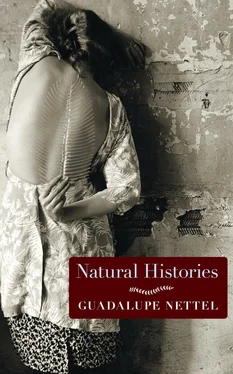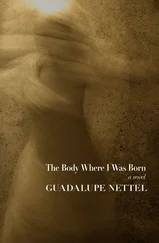“Your mother has decided to check herself into a clinic. We think it’s best and we are supporting her.”
Before I could answer, Claudine left the room so we’d be alone. Mom trembled in silence. I went over to the couch and with all the affection in the world hugged her. All of my doubts disappeared in that moment; as accustomed as I’d become to the new family, I still belonged to her and it was with her that I wanted to live. In a low voice, a voice for secrets, I told her about my cousins, about how horrible riding the bus with them was; I exaggerated as much as I could my living conditions so that she would take me with her to the studio, to the clinic, to wherever. I promised to take care of her and in response I received the heat of her tarred breath. After a few minutes my aunt returned to take her away.
I remember the heavy downpour that fell that night. Isabel and Clemencia knocked on my door several times. The silhouette of the umbrella reflected in one of my windows. It’s not that I didn’t want to see or speak to them. I just didn’t have the strength to get out of bed and open the door. The only company I had was that of a very small cockroach who remained near the desk in the corner all night. An orphaned cockroach, probably frightened, who didn’t know which way to turn.
The ties between animals and human beings can be as complex as those that bind us people. There are some who maintain bonds of reluctant cordiality with their pets. They feed them, they take them for walks if need be, but rarely do they speak to them other than to scold or “educate” them. In contrast, there are others who make of their turtles their closest confidants. Every night they lean in toward their tanks and tell them about what happened to them at work, the confrontation they put off with their boss, their doubts, and their hopes for love. Among domestic animals dogs get particularly good press. It is even said that they are man’s best friend because of their loyalty and nobility, words that often signify nothing more than a tolerance for abuse and abandonment. Dogs are generally good animals, true. But I’ve also heard about some who don’t recognize their masters and, fed up or in a fit of madness, attack them, causing the same bewildered reaction as when a mother hits her young children. Felines on the other hand suffer a reputation of being selfish and overly independent. I don’t at all share this opinion. It’s true that cats are less demanding than dogs and their presence often much less imposing, at times barely even noticeable. However, I know from experience that they can come to develop enormous empathy toward others of their species, as well as toward their owners. In reality, cats are highly versatile animals and their natures range from the ostracism of a turtle to the omnipresence of a dog.
My understanding of cats goes back to when I was still in college. I was finishing a degree in history and my dream was to do my postgraduate work abroad, at a prestigious university if possible. In those days I was renting a spacious and sunny apartment I occasionally shared with other students and then later on with two cats. Now that I think about it, roommates can sometimes fill the role of pets and ties with them are just as complex. Two men and one woman lived with me in that apartment. The first studied architecture but was passionate about tattoos. He decorated his room with colorful posters of naked Japanese men and almost never opened his curtains. The woman was more social. She liked to invite friends over and organize movie marathons with them. However, she was a closet bulimic, which made splitting the cost of groceries unfair and an issue she refused to discuss with me. The day I felt obligated to say something she decided to move out. The third tenant, a man with a much more low-key personality, was studying to be a doctor and spent a lot of time at the hospital. As he was never around, he was by far the best. He stayed just over six months, and then left the city to complete his residency.
The cats, unlike the roommates, provided genuine and stable company. When I was a child several animals passed through my parents’ house: a rabbit, a German Shepherd, a hamster, and two European house cats who never met each other. While I considered the pets of my childhood to be mine, they were never my responsibility. All I had to do was enjoy them; their care was in the hands of my parents. But the cats I had as a student depended entirely on me. From the moment they entered my life I felt I had to protect them, and it was that feeling, completely new to me, that made me adopt them.
They appeared one unusually cold morning in December. Marisa, my thesis advisor and someone who was becoming a friend, called to tell me she had found them in a plastic bag in the street, tied together by someone who obviously wanted them dead. They were kittens still too young to be weaned. I was so moved by the story that I said I would take them and immediately went to pick them up. My compassion toward them grew when I opened the box and saw them, voicelessly mewing and still trembling from going so long without oxygen.
“Keep a close eye on them,” my advisor recommended. “They may have suffered lesions on their brains. It wouldn’t hurt to bring them to a vet.”
That’s what I did. I took them to the clinic she recommended and there I learned their approximate age and sex. They were a male and a female. He, black like a bad omen with little white markings between his nose and whiskers; she, striped, a bit reddish, rather small in frame and thin. A poet and an actress, I thought. I decided to call them Milton and Greta. Months later, when they’d recovered and began to reveal their true personalities, I’d find that the names couldn’t have suited them better; the male displayed a sullen disposition, but also an incredible generosity; and the female, the attitude of a diva fully aware of her beauty. I barely got to see them in the first days after I brought them home. As soon as we arrived and I took them out of the box they ran and hid behind the refrigerator. The sound, I imagine, reminded them of their mother’s purr. Instead of trying to force contact upon them, I’d leave them plates of food and milk so that they could eat when they were alone and felt safe.
After two weeks the cats had not only come out of hiding, they had taken over the apartment. It had been a few months since I’d shared the apartment with anyone and the company of those two kittens felt wonderful. I watched them from my desk in a corner in the living room as they leapt about on the furniture, sprang onto the coffee and dining tables with surprising agility, and rested peacefully on the floor beneath a sunbeam. Milton liked to be near me when I worked. He’d snuggle against my feet and fall asleep as I typed. Greta, however, preferred that I paid attention to nothing but her, with long, slow caresses. She’d mew for them every time I came home from some outing to the library or movies.
Though I had several friends I’d see from time to time, at parties or public events for my department, that year I led a rather solitary existence, obsessed with writing my thesis to which I dedicated most of my time. I didn’t have a partner. For the first three years of the program I’d been in a stable relationship with another student in the department and I didn’t like any of those I’d met since well enough to sleep with them more than once or twice, more out of loneliness than anything else and always in an intoxicated state and late at night. The cats eased considerably that need for affection. The three of us were a team. I contributed a quiet and maternal energy; Greta, liveliness and coquetry; and Milton, masculine vigor. So pleasant was the equilibrium we established between us that I thought a long while before choosing a roommate with whom to split the utility bills. I still interviewed possible new candidates as they turned up but I didn’t accept any of them, for fear the intruder would disrupt the atmosphere in the house. The cats did not look kindly on having a fourth person, either. Aware — god knows how — of my intentions, they were visibly hostile toward the candidates. If a girl, Greta would bare her fangs and raise every hair on her body. If on the other hand the candidate was a guy, Milton would shamelessly mark his territory by urinating on the interested student’s shoes. Thankfully, the scholarship I had at the time was enough to cover the bills.
Читать дальше












